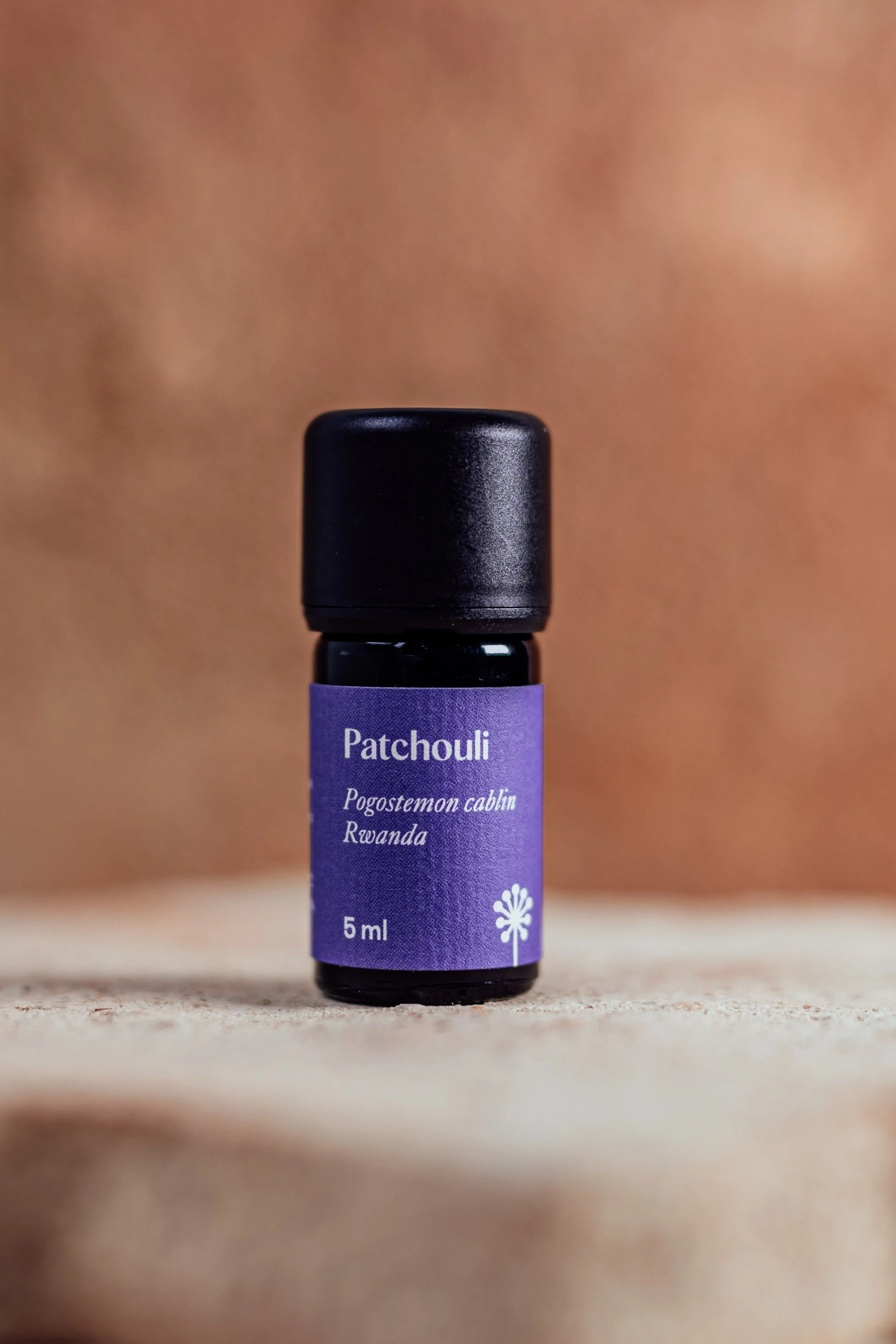-
-
Patchouli essential oil is generally well-tolerated, though its rich, viscous nature means a little goes a long way.
Adults (general use): 1–3% dilution
Adults (short-term/localised use): up to 10%
Facial use or sensitive skin: 0.5–1% is ideal
Children 0–2 years: 0.1–0.3%
Children 2–7 years: 0.5–1.5%
Children 7–12 years: 0.75–2.25%
Always dilute essential oils before applying to the skin. Patchouli is particularly concentrated and should be used sparingly in blends intended for regular or daily use.
Due to its tenacious aroma and fixative nature, Patchouli is also potent in natural perfumery even at low percentages (0.1–0.5%).
-
A master of transmutation, Patchouli brings presence to the body and helps anchor the spirit into the physical realm. Deep, earthy, and unhurried, this oil teaches us to stay grounded in the now, reminding us to feel, observe, and connect with our environment rather than dissociate or over-intellectualise.
Energetically, Patchouli is stabilising and richly embodied. It holds a steady vibration that helps draw excess energy down through the chakras, particularly supporting the root and sacral centres. It is especially valuable for those who are energetically scattered or who tend to disconnect from the body during periods of stress or spiritual work.
Traditionally associated with ritual, protection, and sensuality, Patchouli has been used in sacred rites across many cultures. In psychic or intuitive work, it serves as an anchor, helping maintain energetic boundaries while navigating subtle realms. Its dense aroma offers both spiritual weight and quiet power, restoring coherence between the physical and etheric bodies.
-
Patchouli supports emotional grounding when we feel scattered, overwhelmed, or stuck in cycles of overthinking. Its deep, earthy aroma has a centring effect, bringing awareness back to the breath, the body, and the present moment. It’s particularly helpful during times of emotional upheaval or burnout, when the nervous system feels taxed or the mind is racing.
This oil encourages slowing down and reconnecting with embodied presence. It may be used to gently regulate emotional intensity, especially when navigating stress, irritability, or exhaustion. Patchouli has a steadying effect on mood and is often chosen during times of emotional integration, such as transitions, endings, or deep inner processing.
For those working through body, image concerns or struggles with embodiment, Patchouli offers quiet reassurance. It reminds us that our body is a sacred home, not something to escape, but to inhabit with dignity and care.
Used in meditation, breathwork, or body oiling rituals, it can become a fragrant ally for restoring a sense of coherence between mind, body, and heart.
-
Patchouli essential oil has a long-standing traditional use in topical preparations that support skin health and resilience. Its properties make it a popular choice in blends designed for:
Skin integrity and repair: Traditionally used to support the appearance of scars, blemishes, and minor wounds.
Soothing inflammation: Often included in preparations to relieve skin discomfort associated with dryness or irritation.
Cooling and calming: May assist in formulations aimed at easing muscle tension and calming the body’s response to physical stress.
General skin conditioning: Valued for its moisturizing effects on rough, mature, or reactive skin types.
Environmental defence: Its distinctive aroma is known to help deter insects when diffused or applied (diluted) to exposed areas.
This oil’s cell-reparative and mildly antiseptic nature makes it well-suited for inclusion in deodorant blends, post-sun care, and general skin tonics
-
Earthy. Deep. Mystically grounding.
Patchouli unfolds with a rich, velvety earthiness—moist soil after rain, worn leather, soft woods, and dried herbs. Beneath that lies a slightly sweet, smoky warmth that deepens over time. A classic fixative in perfumery, its scent lingers with a musky persistence that softens and matures beautifully with age.
Used sparingly, patchouli anchors a blend. Used boldly, it steals the show.
-
Patchouli essential oil is generally regarded as non-toxic and non-irritating. However, as with all essential oils, it must be diluted prior to topical application. Overuse may result in skin sensitisation, especially in individuals with sensitive skin or a history of allergic reactions.
If you are pregnant, breastfeeding, or managing a medical condition, we recommend seeking guidance from a qualified clinical aromatherapist or healthcare practitioner before use.
Although our founder is extensively trained in clinical aromatherapy and aromatic medicine, we do not recommend internal use of essential oils without the supervision of a qualified practitioner. Internal use requires professional assessment, specific knowledge, and strict dosage control.
Always avoid contact with the eyes, mucous membranes, and broken skin. Keep out of reach of children.
-
Store in a cool, dark place, away from direct heat, light, and moisture. Keep the bottle tightly sealed to preserve the oil’s integrity and protect against oxidation.
Packaged in amber or violet glass, Patchouli is highly stable, but over time, especially if frequently exposed to air, its aroma can darken or lose nuance.
Shelf life: 3–5 years when stored correctly. Discontinue use if the scent shifts noticeably, becoming dull, sour, or aniline like.


